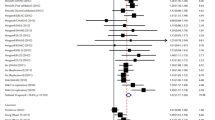Abstracts
The relationship between excision repair cross-complementing group 5 (ERCC5) rs17655 polymorphism and lung cancer risk remains controversial. To clarify the association, we conducted a comprehensive meta-analysis of all published case–control studies. PubMed, Web of Science, and CNKI were searched to identify the possibly eligible publications. Pooled odds ratio (OR) was estimated using the fixed effect model. Q test and I 2 index were used to evaluate heterogeneity between studies, and Egger’s and Begg’s tests were utilized to assess publication bias. Meta-analysis of nine case–control studies including 4,044 cases and 5,100 controls indicated that there was no global association between rs17655 polymorphism and lung cancer risk. Subgroup analyses according to ethnicity and histologic type revealed similar results. In summary, our meta-analysis suggests that ERCC5 rs17655 polymorphism may not contribute to genetic susceptibility for lung cancer.



Similar content being viewed by others
References
Wood RD et al. Human DNA repair genes. Science. 2001;291(5507):1284–9.
Bernstein C et al. DNA repair/pro-apoptotic dual-role proteins in five major DNA repair pathways: fail-safe protection against carcinogenesis. Mutat Res. 2002;511(2):145–78.
Yu Z et al. Human DNA repair systems: an overview. Environ Mol Mutagen. 1999;33(1):3–20.
Thompson LH, West MG. XRCC1 keeps DNA from getting stranded. Mutat Res. 2000;459(1):1–18.
Chyou PH, Nomura AM, Stemmermann GN. A prospective study of the attributable risk of cancer due to cigarette smoking. Am J Public Health. 1992;82(1):37–40.
Abbasi R et al. Laryngeal cancer risk associated with smoking and alcohol consumption is modified by genetic polymorphisms in ERCC5, ERCC6 and RAD23B but not by polymorphisms in five other nucleotide excision repair genes. Int J Cancer. 2009;125(6):1431–9.
Blomquist TM, Crawford EL, Willey JC. Cis-acting genetic variation at an E2F1/YY1 response site and putative p53 site is associated with altered allele-specific expression of ERCC5 (XPG) transcript in normal human bronchial epithelium. Carcinogenesis. 2010;31(7):1242–50.
Wei Q et al. Reduced DNA repair capacity in lung cancer patients. Cancer Res. 1996;56(18):4103–7.
Crawford EL et al. CEBPG regulates ERCC5/XPG expression in human bronchial epithelial cells and this regulation is modified by E2F1/YY1 interactions. Carcinogenesis. 2007;28(12):2552–9.
Emmert S et al. The human XPG gene: gene architecture, alternative splicing and single nucleotide polymorphisms. Nucleic Acids Res. 2001;29(7):1443–52.
Kumar R et al. Single nucleotide polymorphisms in the XPG gene: determination of role in DNA repair and breast cancer risk. Int J Cancer. 2003;103(5):671–5.
Narter KF et al. Bladder cancer and polymorphisms of DNA repair genes (XRCC1, XRCC3, XPD, XPG, APE1, hOGG1). Anticancer Res. 2009;29(4):1389–93.
Ma H et al. Polymorphisms of XPG/ERCC5 and risk of squamous cell carcinoma of the head and neck. Pharmacogenet Genomics. 2012;22(1):50–7.
Pardini B et al. DNA repair genetic polymorphisms and risk of colorectal cancer in the Czech Republic. Mutat Res. 2008;638(1–2):146–53.
Jeon HS et al. Relationship between XPG codon 1104 polymorphism and risk of primary lung cancer. Carcinogenesis. 2003;24(10):1677–81.
Cui Y et al. Polymorphism of xeroderma pigmentosum group G and the risk of lung cancer and squamous cell carcinomas of the oropharynx, larynx and esophagus. Int J Cancer. 2006;118(3):714–20.
Sakiyama T et al. Association of amino acid substitution polymorphisms in DNA repair genes TP53, POLI, REV1 and LIG4 with lung cancer risk. Int J Cancer. 2005;114(5):730–7.
Zhu ML et al. Association between the ERCC5 Asp1104His polymorphism and cancer risk: a meta-analysis. PLoS One. 2012;7(7):e36293.
Higgins JP, Thompson SG. Quantifying heterogeneity in a meta-analysis. Stat Med. 2002;21(11):1539–58.
Mantel N, Haenszel W. Statistical aspects of the analysis of data from retrospective studies of disease. J Natl Cancer Inst. 1959;22(4):719–48.
DerSimonian R, Laird N. Meta-analysis in clinical trials. Control Clin Trials. 1986;7(3):177–88.
Egger M et al. Bias in meta-analysis detected by a simple, graphical test. BMJ. 1997;315(7109):629–34.
Liang Gang LD. Polymorphisms in DNA repair genes and susceptibility to lung cancer, [doctoral dissertation]. China Xiehe Medical University, 2004: p. 1–122. cdmd.cnki.com.cn/Article/CDMD-10023-2006147134.htm.
Shen M et al. Polymorphisms in the DNA nucleotide excision repair genes and lung cancer risk in Xuan Wei, China. Int J Cancer. 2005;116(5):768–73.
Chang JS et al. Nucleotide excision repair genes and risk of lung cancer among San Francisco Bay Area Latinos and African Americans. Int J Cancer. 2008;123(9):2095–104.
Sakoda LC et al. Germ line variation in nucleotide excision repair genes and lung cancer risk in smokers. Int J Mol Epidemiol Genet. 2012;3(1):1–17.
Zeng Hong KM. Associations of XPA A23G and XPG His1104Asp polymorphisms with susceptibility to lung cancer. Guangdong Medical Journal. 2013;34(3):413–6.
Bernig T, Chanock SJ. Challenges of SNP genotyping and genetic variation: its future role in diagnosis and treatment of cancer. Expert Rev Mol Diagn. 2006;6(3):319–31.
Weiss JM et al. Nucleotide excision repair genotype and the incidence of endometrial cancer: effect of other risk factors on the association. Gynecol Oncol. 2006;103(3):891–6.
Koeppel F et al. Irofulven cytotoxicity depends on transcription-coupled nucleotide excision repair and is correlated with XPG expression in solid tumor cells. Clin Cancer Res. 2004;10(16):5604–13.
Cheng L et al. Expression of nucleotide excision repair genes and the risk for squamous cell carcinoma of the head and neck. Cancer. 2002;94(2):393–7.
Bartolucci R et al. XPG mRNA expression levels modulate prognosis in resected non-small-cell lung cancer in conjunction with BRCA1 and ERCC1 expression. Clin Lung Cancer. 2009;10(1):47–52.
Hung RJ et al. International Lung Cancer Consortium: pooled analysis of sequence variants in DNA repair and cell cycle pathways. Cancer Epidemiol Biomarkers Prev. 2008;17(11):3081–9.
Wakasugi M, Sancar A. Order of assembly of human DNA repair excision nuclease. J Biol Chem. 1999;274(26):18759–68.
Conflicts of interest
None
Author information
Authors and Affiliations
Corresponding author
Rights and permissions
About this article
Cite this article
Liang, Y., Deng, J., Xiong, Y. et al. Genetic association between ERCC5 rs17655 polymorphism and lung cancer risk: evidence based on a meta-analysis. Tumor Biol. 35, 5613–5618 (2014). https://doi.org/10.1007/s13277-014-1742-2
Received:
Accepted:
Published:
Issue Date:
DOI: https://doi.org/10.1007/s13277-014-1742-2




